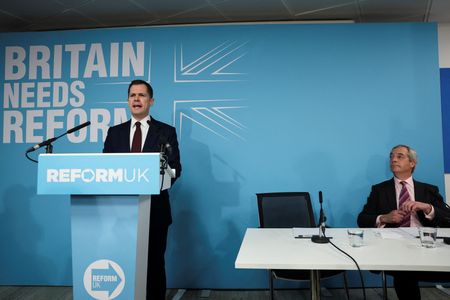By William Schomberg
LONDON (Reuters) -Britain’s government borrowed a lot more than forecast in June, according to official data published on Friday that highlighted the big budget challenges facing the new government of Prime Minister Keir Starmer.
Public sector net borrowing, excluding state-controlled banks, was a larger-than-expected 14.5 billion pounds ($18.75 billion) last month.
A Reuters poll of economists had pointed to an increase of 11.5 billion pounds.
Dennis Tatarkov, Senior Economist at KPMG UK, said the data showed “the daunting task” for the new government to fund its agenda without worsening the public finances.
“A combination of high levels of spending and weak growth prospects will present uncomfortable choices – deciding between even more borrowing or substantially raising taxes if spending levels are to be maintained,” he said.
New finance minister Rachel Reeves is likely to announce her first budget after parliament’s summer recess.
She and Starmer have ruled out increases in the rates of income tax, corporation tax and value-added tax, leaving her little room for manoeuvre to improve public services and boost investment.
Reeves has ordered an immediate review of the new government’s “spending inheritance”, a move that lawmakers from the opposition Conservative Party say could presage increases in taxes on capital gains or inheritances.
“Today’s figures are a clear reminder that this government has inherited the worst economic circumstances since the Second World War, but we’re wasting no time to fix it,” Darren Jones, a deputy Treasury minister, said after the data was published.
Starmer’s government says it will speed up Britain’s slow-moving economy – and generate more tax revenues – via a combination of pro-growth reforms and a return to political stability that will attract investment.
The borrowing figure for June was 2.9 billion pounds higher than expected by Britain’s budget watchdog whose forecasts underpin government tax and spending plans.
In the first three months of the financial year which began in April, borrowing was 3.2 billion pounds higher than projected by the Office for Budget Responsibility at 49.8 billion pounds.
The Office for National Statistics said June’s borrowing was the lowest for the month since 2019, helped by a big drop in spending on interest paid on bonds linked to inflation which has slowed sharply.
But the deficit was made bigger by a 1.2 billion-pound fall in social security contributions compared with June 2023.
They were cut by former Prime Minister Rishi Sunak before the July 4 election that swept Starmer’s Labour Party to power.
Public sector net debt stood at 99.5% of economic output, the highest since the early 1960s.
($1 = 0.7732 pounds)
(Reporting by William SchombergEditing by Sarah Young and Christina Fincher)










